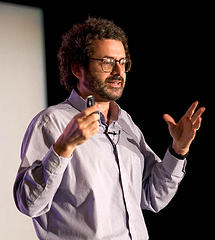
Also while in Manchester last week I had the pleasure of attending a forum discussion on Fablabs, the MIT instigated open workshop platform. The morning was hosted by the well kept secret that is the Manufacturing Institute, the UK's national charity for promoting and educating about manufacturing - also a player in bringing about the UK's first fablab, to be sited in East Manchester.
The MI brought together Dr. Neil Gershenfeld of MIT's Centre for Bits and Atoms, representatives of the MI and of industrial sponsors, the regeneration director for New East Manchester, as well as, via video conference, 3 different Fablabs across Europe and Dr. Adrian Bowyer of the Reprap project (and the University of Bath). It was a very interesting morning, mostly to hear Gershenfeld and Bowyer speak, and to see just how many and how varied the existing Fablabs are.
[caption id="attachment_3955" align="aligncenter" width="215" caption="Dr. Neil Gershenfeld, photographed at Etech by James Duncan Davidson"]
 [/caption]
[/caption]Dr. Gershenfeld started by introducing the Centre for Bits and Atoms, and launched straight into a rather mind boggling animation depicting a protein-like string of particles, which, when programmed with a code, would gradually wriggle into the form of a wrench. Then, disassembled and re-programmed, into a hammer! This had the effect, I realised later, of both exciting and subsequently disappointing those in the audience less familiar with digital fabrication as they realised that this technology would not be available in their debut fablab in the very near future. But man it was cool.
What came across really strongly through both Gershenfeld and Bowyer were the links between digital fabrication and not only biology (Reprap is a reproducing machine after all), but economics and sociology. Both academics are engaged in biomimetics, and see digital fabrication, a) as an evolutionary thing and, b) as one that is approaching and should be inspired by natural models.
The Fablab is a workshop that provides open access to digital fabrication tools to all for free, and this model appears to work more efficiently than schools and universities for learning these topics - indeed the first one arose out of MIT's How to Make Anything course, basically a workshop course that took on a life of its own. Gershenfeld points out that as technology develops so quickly , we really should know how to use these tools before even getting to university, but that links between Fablabs and schools have historically floundered: they function much better as a community resource - like a library for making. Gershenfeld also kept coming back to five inter-related effects of Fablabs that can not be separated:
Empowerment - Education - Problem Solving - Job Creation - Invention
It made me think that these are all areas that can really help people in a variety of situations, for all sorts of reasons. At the end of the day, Fablabs are about making stuff, and making stuff, informally, on their own terms is good for people.
Finally, both academics emphasised that digital fabrication really redefines the divisions of labour - whether it be by removing designers and manufacturers, or erasing the lines between design, production and use. "Digital fabrication is good for personal fabrication - for making products for a market of one person ... mass production is for the least interesting things."
Incidentally, I'd really like to link up with others in Glasgow who would be interested in setting up a Fablab, do respond below if you have any comments. The Fab Foundation is a better source of info, and there is a site for Fablabs user in Fabfolk.com.
Update: Imran Ali also has a good post up about the Manchester forum discussion.



No comments:
Post a Comment